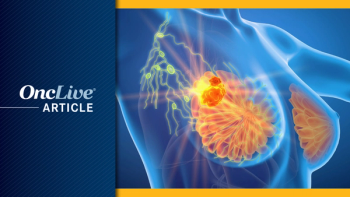
Updated Results Confirm Aldoxorubicin Superiority in STS
Aldoxorubicin demonstrated significant benefit to progression-free survival (PFS) compared with doxorubicin in patients with first-line, metastatic, locally advanced or unresectable soft tissue sarcomas
Sant Chawla, MD
Aldoxorubicin demonstrated significant benefit to progression-free survival (PFS) compared with doxorubicin in patients with first-line, metastatic, locally advanced or unresectable soft tissue sarcomas (STS), according to the results of an international phase IIb trial.
Both the investigator analysis and blinded central laboratory review showed an 80%-100% improvement in STS patients treated with aldoxorubicin. In the investigator analysis, median PFS was 8.4 months in the aldoxorubicin arm compared with 4.7 months in the doxorubicin arm (P = .0002). The blinded review showed that median PFS in the aldoxorubicin arm was 5.7 months compared with 2.8 months in the doxorubicin arm (P = .018).
“These results are extraordinary for a single agent treating these chemotherapy-resistant tumors,” Sant Chawla, MD, of the Sarcoma Oncology Center in Santa Monica, California, and principal investigator of the study, said in a statement. “Aldoxorubicin is the first and only single agent to surpass doxorubicin as a first-line treatment for soft tissue sarcomas.”
Aldoxorubicin is a combination of doxorubicin and a novel single-molecule linker that binds directly to circulating albumin. Protein-hungry tumors concentrate albumin, which increases the delivery of the linker molecule (with attached doxorubicin) to tumor sites. Doxorubicin is then released in the acidic environment of the tumor, leaving the neutral environment of healthy tissues unaffected. This proposed mechanism of action allows for 3.5-4 times greater doses of doxorubicin to be administered in a greater number of drug cycles while reducing toxic side effects.
In the trial, 123 patients were randomized 2:1 to receive aldoxorubicin (n = 83) or doxorubicin (n = 40). Aldoxorubicin was administered at a dosage of 350 mg/m2 (doxorubicin equivalents of 260 mg/m2) as a 30-minute intravenous infusion on day 1 of each cycle (defined as a 21-day period). Doxorubicin was administered at a dosage of 75 mg/m2 as a 5-30 minute infusion on day 1 of each cycle. Patients were administered cycles of treatment until they were either withdrawn from therapy or until they had received the maximum 6 cycles. CT scans were used to assess tumor response and progression every 6 weeks.
The investigator analysis found that 67.1% of the aldoxorubicin group had not progressed at 6 months compared with 36.1% of the doxorubicin group (P = .005). The blinded central lab review determined that 46.8% of the aldoxorubicin group had not progressed at 6 months compared with 23.7% of the doxorubicin group (P = .038).
Investigators reported that the overall response rate was 25.4% in patients treated with aldoxorubicin (2.7% complete response, 22.7% partial response) compared with 5.4% of patients treated with doxorubicin (0% complete response, 5.4% partial response). The blinded central lab review assessed that 23.0% of patients treated with aldoxorubicin had a partial response, whereas none of the patients treated with doxorubicin indicated any objective response.
Aldoxorubicin was determined to be safe and well tolerated. Adverse events (AEs) associated with aldoxorubicin in this trial were consistent with known side effects of doxorubicin and were resolved before the administration of the next dose. Aldoxorubicin also was not associated with any deaths or AEs that required treatment discontinuation in the trial.
In a previous report from this trial in October 2013, Chawla said, patients in the aldoxorubicin arm showed no significant cardiotoxicity, while doxorubicin demonstrated cardiotoxicity at certain cumulative dose levels.
Chawla said that with the data from these two reports, aldoxorubicin could become a treatment of choice for STS. He added that the drug’s potential extends even further because, “doxorubicin in particular and anthracyclines in general are indicated as first- or second-line therapy for many other common cancers including breast, ovarian, small-cell lung, multiple myeloma, acute myelocytic leukemia and more.
“As such, the ability of aldoxorubicin to safely administer high doses of doxorubicin holds tremendous therapeutic potential to oncologists and their patients worldwide.”
Aldoxorubicin is being developed by CytRx Corporation, based in Los Angeles, California.



































